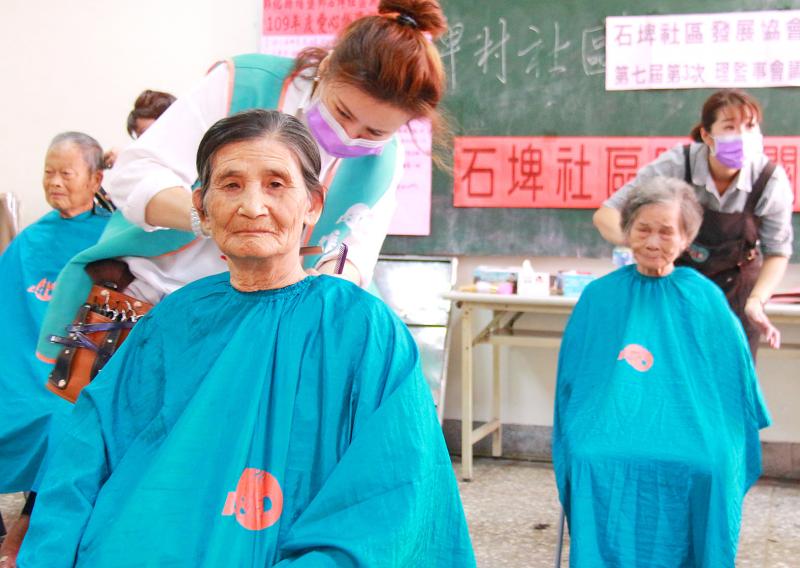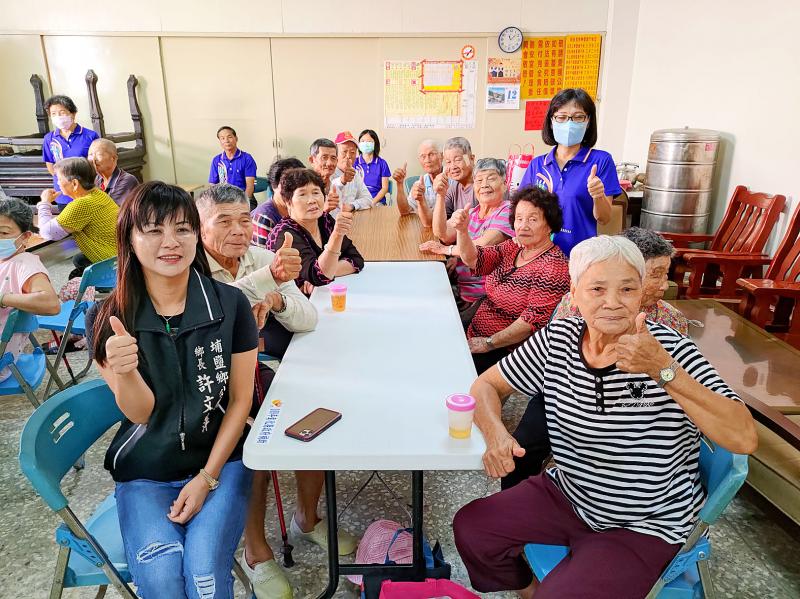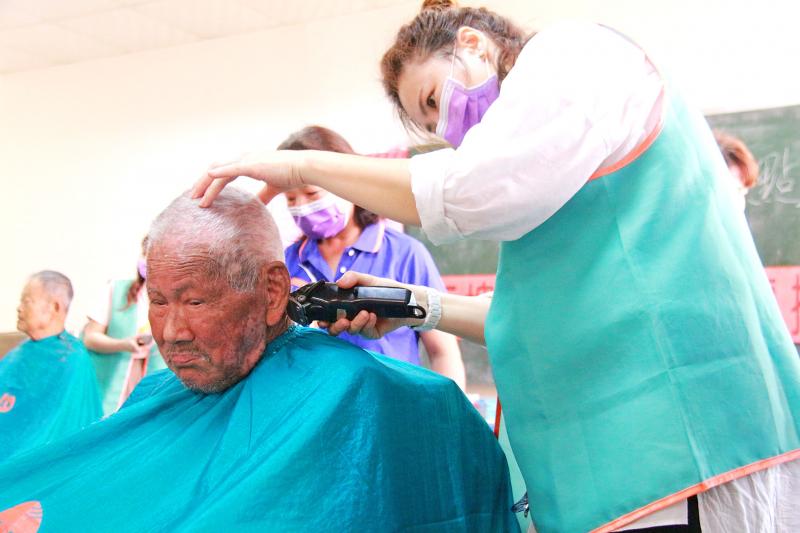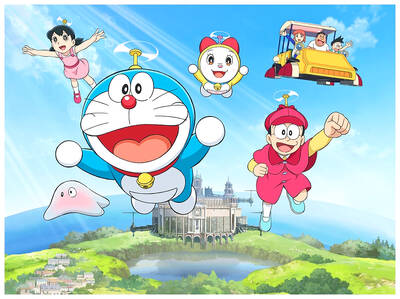In the remote Shibi Village in Changhua County’s Puyan Township, one quarter of the population is aged above 65 years old. With young villagers having moved out of the village, it has been left without a single hairdresser. This has meant that, to get their hair cut, villagers have to make a troublesome 5km trip to a downtown area. To solve the problem, Puyan Township Mayor Hsu Wen-ping partnered with volunteer hairstylists from And Hair Salon and on Monday held a free hair cut service at the village’s town hall. Nearly 100 of the village’s elderly residents took up the offer to get their hair cut, with even the village’s oldest resident — 102-year-old centenarian Shih Ho-cheng — lining up in his wheelchair to get his locks trimmed.
Shibi Village is located in the most south-westerly corner of Puyan Township and its residents are mostly engaged in the agriculture. Hsu says that due to the younger generation having left the village for work, the village’s hairdressers and barbershops one after another closed up shop, leaving the village without a single hairdresser for over a decade. On learning that And Hair Salon provides a free hair cutting service staffed by volunteers, Hsu paid an official visit to the hair salon, which immediately agreed to help out and dispatched eight of its stylists to the village.
Eighty-three-year-old female village resident Huang Tzu has been cutting her hair by herself for many years, which she said leaves her looking like a scarecrow. After getting her hair cut by a professional hairdresser, Huang said she feels revitalized and a full 10 years younger: that’s one satisfied customer.

Photo: Chen Kuan-pei, Liberty Times 圖片:自由時報陳冠備
(Liberty Times, translated by Edward Jones)
彰化縣埔鹽鄉石埤村位處偏遠,全村有四分之一人口都是六十五歲以上,因年輕人口流失,當地連一間理髮廳都沒有,村民剪髮必須跑到五公里外的鬧區,相當不便。為此埔鹽鄉長許文萍結合雅頓時尚造型集團,於週一前往石埤社區活動中心舉辦義剪活動,吸引近百名長者來理髮,連石埤村最高齡的百歲人瑞,一百零二歲的施合成,也被家人推著輪椅來排隊剪髮。
許文萍表示,石埤村位在埔鹽鄉最西南角,村民多以農務為主,但年輕人多出外打拼,以致當地理髮廳相繼關門,已有十多年都沒有新的理髮廳營業。許文萍得知雅頓集團有在幫偏鄉義剪,因此前往拜會,立即獲得認同,還派出八名設計師義剪。

Photo: Chen Kuan-pei, Liberty Times 圖片:自由時報陳冠備
八十三歲的黃足女士說,多年來她都自剪,頭髮不免雜亂無章,這次有設計師剪,好像年輕十幾歲,也變得有精神許多,相當滿意。
(自由時報記者陳冠備)

Photo: Chen Kuan-pei, Liberty Times 圖片:自由時報陳冠備

A: The National Palace Museum (NPM) has launched an exhibition, titled “From Impressionism to Early Modernism.” There are 81 masterpieces from the Metropolitan Museum of Art on display now. B: The exhibit, held to celebrate the NPM’s centennial, must be so spectacular. A: It includes artworks by 38 artists, such as Renoir, van Gogh, Cezanne, Matisse and Gauguin. B: The Fubon Art Museum has also launched an exhibit featuring a number of artworks of Impressionism, including Monet’s “Water Lilies.” A: And the New Taipei City Art Museum just had its grand opening, so there are even more exhibitions

A: What exhibitions are you going to see this summer? B: The 100% Doraemon & Friends exhibit is set to open on June 28. A: The news says there will be a 12-meter-tall giant Doraemon model at the Huashan 1914 Creative Park. B: The One Piece Carnival will set sail on the same day. A: And the D’festa Taipei 2025 – featuring exclusive content from K-pop supergroups such as BTS, NCT and Twice – is also set to begin next Friday. Isn’t that cool? A: 今年夏天還有什麼展覽可看啊? B: 「100%哆啦A夢 & Friends特展」即將在6月28日開幕。 A: 新聞說在華山1914文創園區會場,還有12米高的巨型哆啦A夢呢! B: 航海王「One Piece歡樂派對嘉年華」也將在同日啟航。 A:

The new generation born between 2025 and 2039 has been officially named “Generation Beta,” or simply “Gen Beta.” This generation will be the first to experience a world where artificial intelligence (AI) plays a key role in daily life. Generations are defined by shared cultural, social and historical experiences within a specific time frame. These experiences, often influenced by significant events and technological advancements, shape the values, attitudes and behaviors of each generation. The concept of generations helps us understand how different age groups interact with their environment and contribute to societal changes over time. The previous generational transition from Gen

Continued from yesterday(延續自昨日) https://www.taipeitimes.com/News/lang As Gen Beta grows, they are expected to witness advanced technologies becoming fully integrated into various fields like education, workplaces, healthcare and entertainment. In addition to technological developments, they will also face big challenges like severe climate change. Influenced by their Gen Y or Gen Z parents, who view climate change as a critical issue for the future and prioritize sustainability, they are likely to focus more on global issues and seek innovative solutions to address them. Moreover, Gen Beta will experience considerable demographic changes, such as lower birth rates and longer lifespans. Consequently, Gen Beta is predicted to